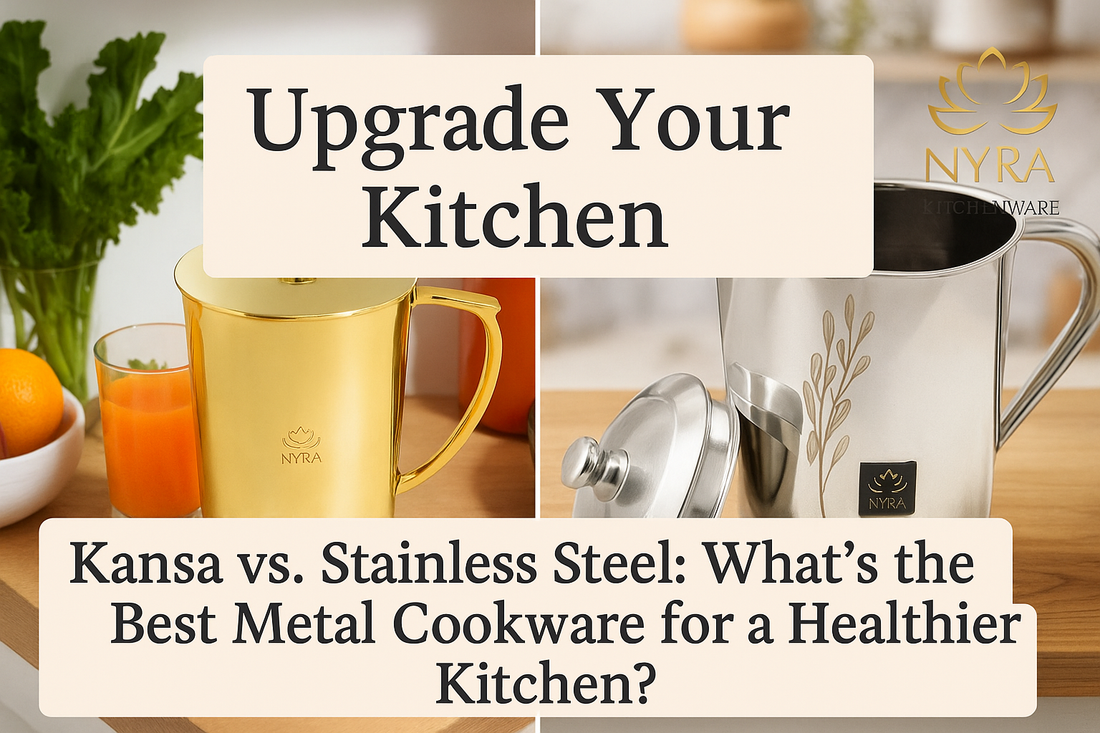
Kansa vs. Stainless Steel: What’s the Best Metal Cookware for a Healthier Kitchen?
Share
When choosing the best cookware or dinnerware for your kitchen, health, durability, and aesthetics play a vital role. While stainless steel is a popular modern option, traditional bronze (also known as kansa) is making a strong comeback, especially among health-conscious and Ayurveda-inspired households.
Let’s explore the differences between bronze vs stainless steel, and why many are switching to kansa cookware for a healthier lifestyle.
What is Kansa or Bronze?
Bronze, or kansa, is an ancient alloy made primarily of copper and tin. Known for its Ayurvedic health benefits, kansa has been used for centuries in Indian households for its digestive and immune-boosting properties. Kansa is often referred to as the healing metal.
Featured Product:
Bronze Handmade Phool Thali | Kansa Handcrafted Traditional Thali
A health-boosting, durable, and elegant dining essential.
Stainless Steel – The Modern Favorite
Stainless steel is durable, rust-resistant, and easy to maintain. It’s a blend of iron, chromium, and nickel, offering modern kitchen convenience with long-lasting performance.
Featured Products:
- Stainless Steel Plates Set – Heavy Gauge Steel Lunch/Dinner Plates
- Premium Stainless Steel Pink Fridge/Refrigerator Water Bottle
- Stainless Steel Laser Printed Jug with Sturdy Handle and Lid – 2 LTR Drinkware
Bronze vs Stainless Steel – Which is Better?
| Feature | Bronze/Kansa | Stainless Steel |
|---|---|---|
| Health Benefits | Boosts digestion, aligns with Ayurvedic wellness | Neutral; no known health benefits |
| Aesthetic Appeal | Rich, traditional, luxurious | Sleek, modern, minimalist |
| Durability | Long-lasting with proper care | Highly durable and corrosion-resistant |
| Heat Retention | Excellent; retains warmth longer | Good, but cools down faster |
| Reactivity with Food | Non-reactive if made with food-grade proportions | Mostly non-reactive |
| Weight | Heavier | Lighter than bronze |
| Price | Premium | Affordable |
Is Bronze Harder Than Steel?
No, steel is generally harder than bronze, especially when we talk about industrial-grade steel. However, bronze is still incredibly durable for cookware and offers longevity when maintained properly.
Is Iron Softer Than Steel?
Yes. Iron is softer than steel. That’s why steel, an alloy of iron and carbon (often with chromium), is preferred for cookware that needs to be tough and durable.
Why Choose Kansa for Your Kitchen?
- Health Benefits: According to Ayurveda, kansa balances body doshas and promotes gut health.
- Naturally Antimicrobial: Bronze has self-sanitizing properties.
- Eco-Friendly & Sustainable: Bronze utensils can last generations.
- Elegant Appeal: Adds a royal and traditional charm to your table.
Explore These Kansa Essentials from Nyra Kitchenware:
- Traditional Bronze/Kansa Jug with Lid – Ayurvedic Metal Jug with Health Benefits
- Bronze/Kansa Donga with Knob Lid and Elegant Serving Spoon – Perfect for traditional meals
- Elegant Bronze/Kansa/Phool Bottle – A beautifully crafted water bottle for everyday use
Conclusion
Choose bronze (kansa) if your priority is health, heritage, and Ayurveda. Go for stainless steel if you need everyday durability, affordability, and modern looks. Better yet, balance both in your kitchen with Nyra Kitchenware’s premium collection of stainless steel and handcrafted bronze cookware.
Whether you're sipping water from a bronze bottle, serving dal in a kansa donga, or plating lunch on steel plates, Nyra Kitchenware brings elegance and wellness to your kitchen.
